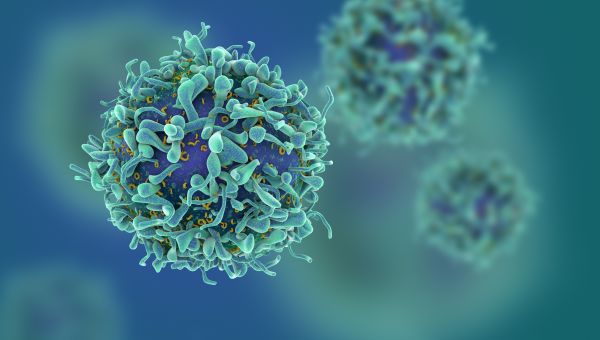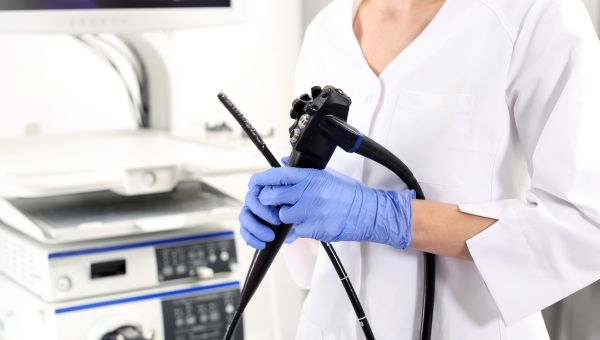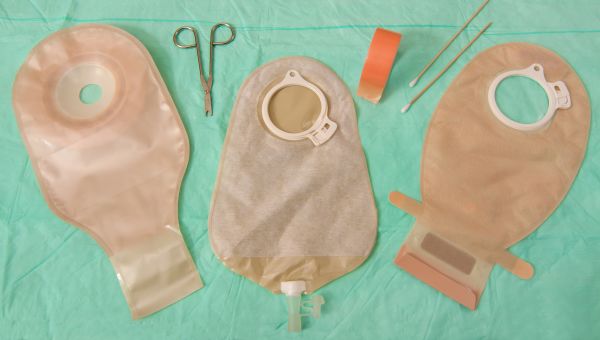11 things to know about colorectal cancer
An expert explains what to know about colorectal cancer, from screenings, to diagnosis, treatment, and more.
Updated on July 17, 2024

Colorectal cancer (also known as colon cancer) affects the colon (large intestine) and the rectum (last several inches of the large intestine). Receiving a diagnosis of colorectal cancer can be bring up a range of emotions. We asked Jill Onesti, MD, a surgical oncologist in Grand Rapids, Michigan, to explain colorectal cancer, from screening and diagnosis to treatment and recovery.

Colorectal cancer is common
Colon cancer and rectal cancer are often grouped together under the term of colorectal cancer because they share many features. Colorectal cancer is the second leading cause of cancer deaths in the United States, according to the National Cancer Institute. With 152,810 cases estimated to occur in 2024, it's also the fourth most common cancer, behind cancer of the breast, prostate, and lungs. (The prostate is a male reproductive organ which sits below the bladder and makes semen.)

Symptoms can be hard to recognize
Colorectal cancer symptoms are often subtle and may include:
- Change in bowel habits, including constipation, diarrhea, or narrowing of the stool
- Rectal bleeding
- Dark stools or blood in stool
- Cramping or abdominal pain
- Weakness or fatigue
- Weight loss
Early stage colon and rectal cancers often have no symptoms. Once symptoms are noticeable, the cancer is often at a more advanced stage, and may be harder to treat.
What makes diagnosis challenging is that these symptoms are often shared by many other conditions, including:
- Irritable bowel syndrome: A digestive condition that causes abdominal discomfort, bloating, and diarrhea and/or constipation
- Diverticulitis: A condition that involves small pouches in the digestive tract that can become inflamed or infected
- Inflammatory bowel disease: A condition involving inflammation of the digestive tract
- Hemorrhoids: Swollen veins in the rectum or anus

Some Risk Factors can be controlled, others cannot
Risk factors are things that increase your chances of developing a medical condition. There are a number of factors that can increase your risk of colorectal cancer. You can control some of these, but others are outside of your control. To reduce your risks, avoid:
- A diet high in saturated fat (which is solid at room temperature, like butter), and low in fiber, with lots of red and processed meat
- A sedentary lifestyle
- Smoking
- Obesity
- Drinking alcohol
Risk factors that you can’t control include a family history of colorectal cancer or colon polyps and a past history of colorectal cancer and colon polyps. Age is another risk factor. Risk generally increases after age 50, though colorectal cancer rates are rising among people younger than 50 for reasons that are not fully clear.
Polyps are masses that grow on the lining of the colon or rectum. Most types of polyps (such as hyperplastic polyps) don’t pose a risk for cancer. Others (such as adenomas), however, are believed to be the origin for most colon cancers. That said, most adenomas do not become cancer.

Early stage colorectal cancer is treatable
In general, the earlier a cancer is caught, the better your chances of successful treatment. For localized colorectal cancer, where the cancer has not spread beyond the colon or rectum, the five-year survival rate is 91 percent. (A five-year survival rate is the percentage of people who are alive five years after diagnosis.)
The survival rate remains fairly high (at roughly 74 percent) for regional colorectal cancer, where the cancer has spread beyond the colon or rectum to nearby structures or lymph nodes. (Lymph nodes are parts of the immune system that form white blood cells and filter foreign substances like cancer cells or infections.) Survival rates decrease sharply (to less than 16 percent) for distant colorectal cancer, when it has spread to distant parts of the body, such as the liver, lungs, or distant lymph nodes.

Screening is important
Current colon cancer screening guidelines from the American Cancer Society (ACS) recommend that people at average risk should start screening at age 45. People with increased risk typically should be screened earlier and more often. Colonoscopies are seen as the gold standard for screening. They should be done every 10 years for people of average risk.
A colonoscopy is a procedure in which a healthcare provider (HCP) uses a long, flexible tube with a light at the end to look inside the large intestine. Even though colorectal cancer grows slowly, screening can help find cancers when they’re in their early stages and more easily treated.
That said, only a little more than half the people who should get screened for colorectal cancer do so. “We certainly try to promote surveillance and encourage people to get screened, but for a variety of reasons people don’t get their colonoscopies, so we still see plenty of people diagnosed at an advanced stage,” says Onesti. To find out when you should be screened, speak with your HCP.

There are multiple screening options
Colorectal cancer screening is not limited to a colonoscopy every 10 years. Screening tests your HCP may recommend may also include the following options, some of which you may need to get more often than a colonoscopy:
- Flexible sigmoidoscopy: Similar to a colonoscopy, this test only examines the rectum and lower colon.
- CT colonography: Also known as a virtual colonoscopy, this test forms three-dimensional pictures of your colon.
- Barium enema: This test evaluates the colon and rectum using X-rays and a contrast solution (a substance that improves the ability to take a picture of certain body parts).
- Fecal immunochemical test: This test involves taking a stool sample at home and sending it to a lab for analysis. The fecal immunochemical test checks for hidden blood in the lower colon and rectum.
- Stool DNA test: Another test that requires you to send a stool sample to a lab. It looks for gene changes that often indicate colon cancer.

Surgery is the main treatment
If colorectal cancer is found, surgery is performed to remove it at almost every stage, says Onesti. Early stage cancers can typically be removed during a colonoscopy. Later-stage cancers usually require what’s known as a resection or colectomy. This surgery involves cutting out the cancerous section of the colon and reattaching the two ends. Surgeons try to take out all of the affected colon, as well as the lymph nodes in the area, if necessary.
“Most [early] stage cancers can be treated with surgery alone,” says Onesti. Once the cancer has spread to the lymph nodes, Onesti recommends chemotherapy (also known as chemo, drugs that kill or slow the growth of cancer) following surgery. “Most colon cancers are not treated with radiation [high-dose X-rays], but rectal cancer is usually treated with chemo and radiation at the same time.”

Surgery may require preparation
Onesti says that strides have been made in pre-surgery preparation to make the surgery itself go more smoothly. “We have a lot more information about what patients can do ahead of their surgery,” she says. “The most important? Quit smoking.”
Smoking raises your risk of complications like infections, pneumonia (infection of the lungs), blood clots, and kidney problems. “You can also get started on a good nutritional program with enough protein and healthy food,” she says. For information about quitting tobacco and how your insurance may help, speak with your HCP.

Hospital stays are usually short
Most colorectal surgeries are minimally invasive, meaning the surgeon makes small cuts in the abdomen to do the operation on your intestines. An open surgery requires large cuts into the abdomen and is done in specific cases, says Onesti, such as if a person might have trouble being under anesthesia or if the cancer is growing somewhere the surgeon can’t reach with minimally invasive surgery. (Anesthesia is a drug that causes temporary loss of feeling and/or awareness, like falling asleep.) While open surgery is quicker, according to Onesti, it means a longer hospital stay. “The vast majority of colon cancer surgeries are minimally invasive,” she says.

Colostomy bags are often not needed
One concerning prospect of colon surgery may be the possibility of needing a colostomy bag for your waste to drain in for the rest of your life. According to Onesti, that concern is largely unfounded. “Most of the time, you won’t need a bag,” she says.
Surgeons attach the two ends of the colon to each other after a portion is removed from the middle, says Onesti, instead of attaching them to a colostomy bag worn outside the body. “There are some situations, particularly with rectal cancer, where you might need a permanent bag,” explains Onesti. “But usually there’s no bag or a temporary one.”

Recovery can be relatively quick
It’s common to be out of the hospital in three to five days after surgery. Following a healthy lifestyle before surgery can help you recover faster afterwards. “When people go home, they can resume their normal activities. They’re often tired, but that goes away in a few weeks,” Onesti says. You’ll need to avoid lifting anything heavy for about a month and you may be unable to go to work for two to six weeks.
Your HCP will likely want to see you every few months for four or five years and possibly more often for certain types of rectal cancer surgery. Within a year you’ll also need a colonoscopy to check again for any polyps or tumors.
“In the past few years there’s been more focus on what healthcare providers and patients can do ahead of the surgery to minimize complications,” Onesti says. “All of our instructions for pre-surgery bowel preparation help surgery go more smoothly and get complications as close as possible to zero.”

American Cancer Society. American Cancer Society Guideline for Colorectal Cancer Screening. Last Revised: January 29, 2024.
American Cancer Society. Cancer Facts & Figures 2024.
American Cancer Society. Key Statistics for Colorectal Cancer. Last Revised: January 29, 2024.
American Cancer Society. Survival Rates for Colorectal Cancer. Last Revised: January 29, 2024.
National Cancer Institute. Cancer Stat Facts: Colorectal Cancer. Accessed July 17, 2024.
National Cancer Institute. Cancer Stat Facts: Common Cancer Sites. Accessed July 17, 2024.
More On


video

slideshow


video


video
